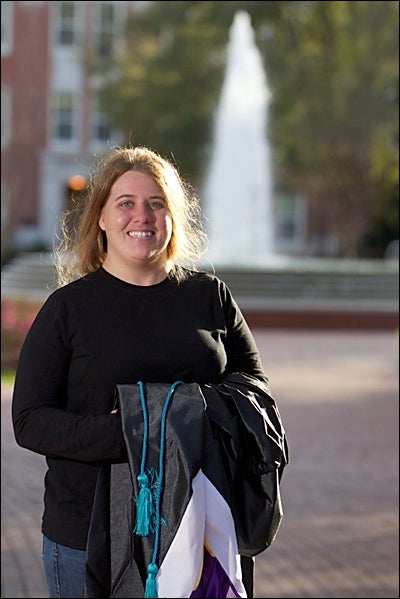AMAZING PACE
ECU graduate walks away from paralysis

ECU graduate Jill Allender overcame tremendous odds to survive a near-fatal traffic accident that initially left her completely paralyzed. On Dec. 16, she will walk with classmates to accept her diploma during commencement ceremonies. (Photo by Cliff Hollis)
Students of sociology are familiar with the Thomas theorem.
“If men define their situations as real,” it states, “they are real in their consequences.”
That premise and her family’s prayers are what carried East Carolina University graduate Jill Allender through an injury few people survive. Jill was confined to a hospital bed when she officially graduated in May. This week, she will finally celebrate the completion of a master’s degree with honors in applied sociology.
Doctors once doubted she would ever move, walk or even breathe on her own again. Her family refused to believe it. They wouldn’t let that prognosis become real.
A near-fatal wreck
Jill suffered an internal decapitation April 30 when a vehicle traveling 60 miles per hour struck the passenger car she was driving near her Beaufort County home. Four broken cervical vertebrae prevented her spine from supporting her head.
She doesn’t remember the wreck. First responders arrived quickly, located a pulse and she was transported to Pitt County Memorial Hospital. Jill woke up in a “locked in” state, she explains, meaning she could only move her eyes.
“She’s the youngest of six,” explained her mother, Beth Allender. “She was put here to fight, and maybe to fight this particular battle.”
Beth, who is also an ECU alumna, has a notebook in which she recorded her daughter’s daily progress. The outside is plain, but Beth considers the timeline inside miraculous.
Declared a quadriplegic, Jill moved her left foot slightly just one week after the accident, Beth reports.
“It was just enough to let you know it was possible, that (recovery) was coming,” Beth recalled.
Significant steps
Jill soon came off the ventilator and was moved out of the intensive care unit. A Greenville orthopedic surgeon was able to fuse her head to her spine by modifying a hipbone plate. On May 18, she said hello to Beth.
With a little more time and some physical therapy, Jill stood up. She walked 30 feet and then 180 feet. She ate pizza again.
“I thought (my recovery) was slow, but they kept telling me how fast it was,” Jill said.
There were hiccups along the way, including a respiratory failure in mid-May. Beth never lost hope, and she never let the doctors tell Jill what her limitations might be.
On June 10, Jill walked out of rehab.
Few physical reminders of the accident remain. Jill bears the scars from the endotracheal tube that enabled her breathing and a metal halo that held her head in place as the bones healed. Skin and tissue on her left arm was marred by the impact. Still, she’s quick to remember how fortunate she is in the face of frustration.
“I woke up smiling and I’ve been smiling since,” Jill said.
An outpouring of support
Family members weren’t the only ones by her side as she regained movement and confidence. Sociology Department faculty started visiting Jill in the hospital less than a week after the accident, bringing food for family members, money and words of encouragement.
“They’re all such good people,” Jill said. “I knew that. But the fact that they all came out? That was surprising.”
Beth expresses embarrassment over not sending thank you cards.
“I owe so many people,” she stressed.
Both she and Jill will get the opportunity to offer their gratitude Friday, in the process of accomplishing something she was meant to do in May. She’ll walk, literally this time, at graduation.
“Everyone in my family and then some are going to be there,” Jill said.
Scheduled to speak to her classmates as part of the departmental ceremony, Jill said she plans to tell them about her reaffirmed belief in the Thomas theorem.
“If you define it as real, it’s real in its consequences,” she paraphrased. “They never told me I was paralyzed. They left me hope.”